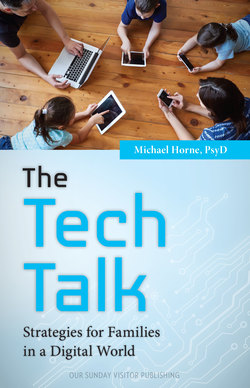Читать книгу The Tech Talk - Michael Horne PsyD - Страница 9
На сайте Литреса книга снята с продажи.
ОглавлениеIntroduction
Have you ever heard someone say the following?
“When I try to talk to my kids, they just ignore me and keep staring at their tablets!”
Or maybe:
“It’s such a fight to get my son to turn off his video game and do his homework.”
Or even:
“This is the third time this week that I’ve found my daughter on her phone hours after she’s supposed to be in bed!”
These are all comments I have heard in my clinical practice from parents who are concerned about their kids and the role technology plays in their lives.
You might have made one of those comments yourself, or one like it. Over the years, an increasing number of parents have brought similar concerns into my office. I suspect this trend will continue unless families are better able to address the influence that technology can have on children.
My interest in digital technology and the impact of media on families grew from a unique career path in which I studied radio, television, and film before beginning work in public television. Over time, my desire to contribute not just to entertaining people, but to helping them find healing, led me to pursue studies in clinical psychology, where I had the opportunity to integrate my faith with the insights of the field, developing an approach to the human person and therapeutic care rooted in the dignity of every individual as made in the image and likeness of God, made for relationship and ordered to eternal life. My background in the media, as well as my research in the area of violent video games, has given me an interesting vantage point from which to view our digital landscape. I hope that some of the insights I have gleaned in research and clinical care will help you and your family to navigate it as well.
In the following chapters, I’m going to discuss how digital technology influences the way we understand ourselves, each other, and the world. For our purposes, I’m going to focus on three areas that have arguably the greatest influence on children and families: social media, video games, and pornography. While video games and social media are products of the digital age, pornography and sexual exploitation, age-old evils, have become deeply entangled with technology, increasing its reach to younger and younger children.
Every good parent wants to help their kid lead a happy and healthy life. A Catholic Christian worldview deepens this desire, prompting parents not simply to hope for an Ivy League college or a fulfilling career for their child, but a life of flourishing, a life steeped in a real relationship with God, holy friendships, the opportunity to discern God’s call in their vocation, and ultimately eternity in heaven. That’s a tall order, even in the best of circumstances. Christian parents today face so many challenges in conveying the faith to their children, and the pressures of digital technology do not make it any less complicated.
My intent in writing this book isn’t simply to point out all the dangers of unmonitored, unsupervised forays into the digital world — though these are important things to recognize. Rather, I want you to walk away with an understanding of what influences are operating online, both positive and negative, and how to respond in a way that best supports your family.
To that end I’ve included some reflection questions at the end of each chapter. These can be used to promote discussion in a group or to prompt additional thought for you, the reader, independently. I believe it is possible to live in our modern world in a fairly normal way, but to do so may first involve stepping back to consider how technology has impacted us to this point, and the role we wish it to play in our family’s future. Contrary to what society may want us to believe, this is still within our control.
When I speak to parents on this topic, I emphasize that I’m not encouraging everyone to rush home and take a hatchet to their computers. I do, however, think that we run the risk of losing balance in our lives if we are not careful to identify what expectations we have about the role of technology in our lives and actively prioritize our values in our digital decisions.
My hope is that this book will raise a few questions for you about your family’s relationship with technology and how closely your choices match up with the values that matter most to you. I would like this to be the start of a conversation about how we and our families are living in the digital age and an opportunity to honestly ask ourselves if we like what we see.
